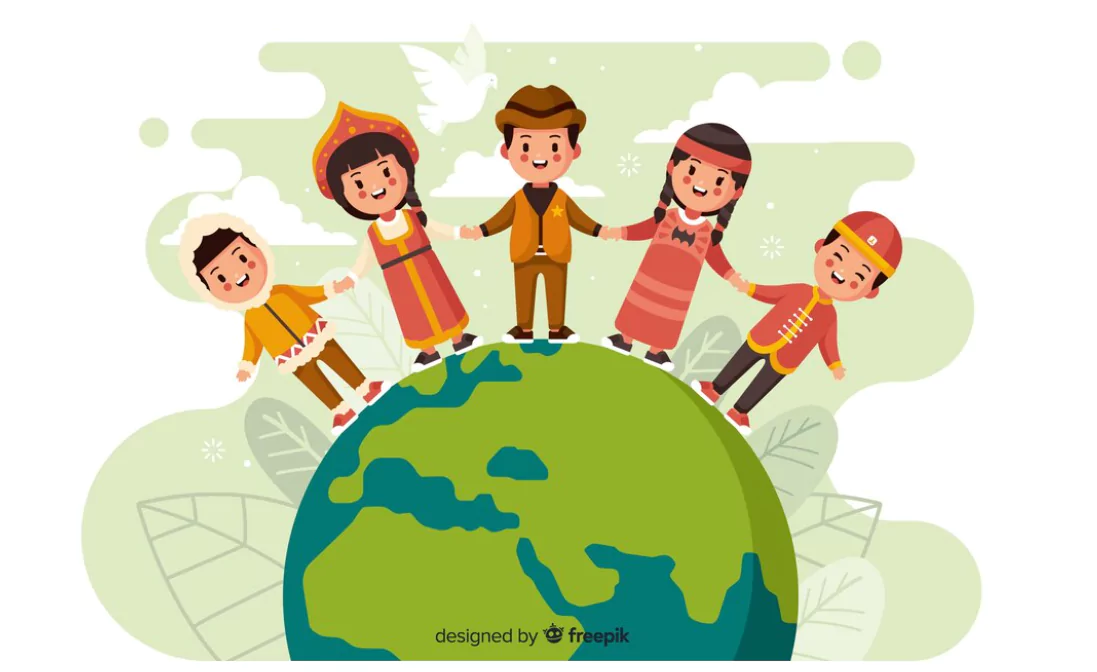
Global citizenship, essentially, requires the acknowledgment of our roles within communities and the broader world. It also means having the wisdom and skills to interact and collaborate with people from different cultures, backgrounds, etc.
Technology has transformed the world into a global village and as parents, we should instill a profound sense of connection in our children, fostering a dual allegiance to both their local and global communities. It should include the impartation of values, such as kindness, compassion, and inclusivity.
What defines an individual as a global citizen, and why is it significant?
Being a global citizen involves recognizing the absence of boundaries in our shared humanity, and acknowledging that human rights and civic responsibilities surpass individual cultures, communities, and nations. Global citizens align themselves with common objectives that contribute to the greater good, such as promoting ecological sustainability, upholding human rights, and addressing global problems.
Evidently, cultivating a global citizen mindset in children offers numerous advantages. Primarily, such children find it easier to display openness and inclusivity in social interactions. They comprehend that fellow members of the human community share commonalities, fostering a deeper sense of empathy and compassion. Introducing children to diverse cultures and lifestyles not only promotes a lifelong love of learning and curiosity but also contributes to their development as responsible and engaged individuals.
In the contemporary landscape, it is more crucial than ever to equip children for a future where they can comfortably engage with individuals from various backgrounds. This preparation not only lays the foundation for a lifetime of good citizenship but also positions them to pursue careers and educational opportunities dedicated to the collective welfare.
Comprehensive Guide to Raising Your Children as Global Citizens
1. Instill Fundamental Values: Empathy & Inquisitiveness:
Encourage and nurture your child’s innate curiosity about people from diverse backgrounds. Rather than dismissing their questions, take the time to engage in meaningful conversations that explore both the differences and similarities among individuals. By acknowledging your child’s emotions, you lay the foundation for them to develop empathy and a deeper understanding of others.
2. Explore Literature on Global Citizenship:
Incorporate children’s books that celebrate various cultures into your child’s reading repertoire. Titles such as “What is Your Language?” by Debra Leventhal, “What Can a Citizen Do?” by Dave Eggers, and “Babies Around the World” by Puck can serve as windows to different cultures. Seek out books that not only introduce the concept of diversity but also emphasize the richness of specific cultures, especially beneficial if your child is bilingual or learning a new language.
3. Introduce Your Child to a Foreign Language:
Learning a second language not only supports cognitive development but also creates a profound connection to another culture. This engagement enhances your child’s understanding and appreciation of art, music, literature, and lifestyle. Being bilingual opens doors to future educational and career opportunities, equipping your children to make a meaningful global impact as they mature.
Recommended reading: 5 REASONS WHY YOUR CHILD SHOULD LEARN A FOREIGN LANGUAGE
4. Aim to Travel Whenever Possible
Travel provides an immersive cultural experience for the entire family. Engage in activities that allow your child to interact with local children, explore museums, attend events, and sample diverse cuisines. Encourage curiosity and open-mindedness, emphasizing that the most enriching experiences often lie beyond typical tourist attractions.
5. Discover Your Community
Arts, Music, and Volunteering:
If international travel isn’t feasible, explore your local community to teach your children about the world. Attend events that celebrate diversity, utilize multicultural resources at universities, and actively participate in international festivals. Volunteering with your children reinforces the principles of global citizenship, demonstrating how individual actions can contribute positively to the world.
Additional Strategies for Fostering Global Citizenship in Your Children
1. Utilize Technology for Cross-Cultural Communication
In today’s interconnected world, technology serves as a valuable tool for building global connections. Encourage your child to engage in virtual pen-pal exchanges or connect with peers from different parts of the world through online platforms. This not only promotes cultural understanding but also helps them appreciate diverse perspectives and global interconnectedness.
2. Embrace Cultural Festivities at Home
Incorporate traditions from various cultures into your family’s celebrations. Whether it’s observing holidays, trying out traditional dishes, or participating in cultural rituals, immersing your child in different customs fosters respect for diversity and a sense of belonging to the global community.
3. Stimulate Critical Thinking on Global Issues
Initiate age-appropriate conversations with your child about pressing global challenges such as climate change, poverty, and human rights. Foster critical, rational thinking by asking open-ended questions and exploring potential solutions together. This not only raises awareness but also instills a sense of duty to contribute positively to the world.
4. Engage with Global Causes through Online Platforms
Explore online platforms dedicated to supporting global causes and involve your child in relevant discussions and activities. Whether participating in virtual charity events or supporting organizations working towards positive change, these experiences empower your child to actively engage with global issues and make a tangible impact.
5. Cultivate Environmental Responsibility
Teach your child about the importance of environmental sustainability and their role in preserving the planet. Practice eco-friendly habits at home, such as recycling, conserving energy, and minimizing waste. Instilling a sense of environmental responsibility contributes to a broader understanding of interconnectedness and global citizenship, fostering a commitment to creating a positive impact on the world.
Recommended reading: RAISING ECO-FRIENDLY CHILDREN- A REMINDER ON WORLD ENVIRONMENT DAY
In conclusion, raising global citizens involves instilling empathy, curiosity, and a genuine appreciation for diversity. By incorporating these practices into your parenting, you’re nurturing children who will contribute positively to their communities and the world at large.
Moonpreneur is on a mission to disrupt traditional education and future-proof the next generation with holistic learning solutions. Its Innovator Program is building tomorrow’s workforce by training students in AI/ML, Robotics, Coding, IoT, and Apps, enabling entrepreneurship through experiential learning.
















How do I teach my child about diversity?
Let them express themselves freely on the topic. Watch antiracism videos and books, and ask them what they thought. Watch a movie with equal representation of genders, races, and sexual orientations and share your thoughts.